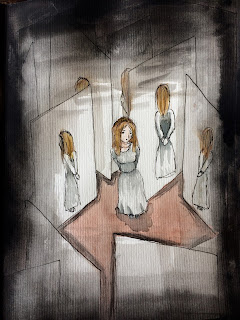Personal Violence
-
a Colossal issue for many families
by
EK Wills
I
recently discovered that a good friend of mine is suffering circumstances that
you only expect to hear about in the news or in families in less fortunate
situations. But she and her husband have respectable jobs, own their own home
and have 3 children at good schools.
She
has not experienced physical pain but endures psychological abuse
indiscriminately and is fearful in her own home.
It
began insidiously with her husband working long hours in a stressful job so he
self medicated with alcohol. He started to become verbally inappropriate when
drinking and this behaviour was tolerated for the sake of the family.
 |
|
© artwork by Coco
|
When
situations become confronting, often we don’t know how to react and so become
paralysed. Maybe attempts are made to appease conflict and smooth over daily
events. This can escalate to what most people would consider intolerable
occurrences of arguments with the children bearing witness to degrading
derogatory comments about their mother and out of control emotions.
Children
can then learn this attitude from what they witness and start to participate in
the abuse, leading to further emotional isolation for the victim. They may not
even want to leave even if their mother decides it is safer for everyone to go.
Domestic
violence is considered to include the obvious form of physical aggression but
also extends to emotional abuse, controlling of finances and social contact as
well as sexual acts. And it can happen to anyone.
Importantly,
there are avenues to get help such as calling the police in an immediate
situation, or speaking to a trusted person such as a friend, GP or health
worker. There are domestic violence services to call and safe places such as
refuges for women and children. Legal
and housing services are available for longer term planning as well.
Often
women tolerate domestic violence because they feel powerless to do anything
about it. They may feel financially trapped or emotionally responsible towards
their children. Many lose self-esteem to the point of not being able to gather
the strength to break the cycle.
But
sometimes it reaches a point of realization for them to force themselves to
act.
 |
|
scene from Colossal (2017), with Anna
Hathaway
|
Colossal
In
the film, Colossal (2017), Anne Hathaway’s character is not going in the direction she
would like and she is losing control herself.
This
contributes to feeling powerless to retaliate against the controlling men in
her life and the violence escalates to the point of physical injury. She
becomes protective of other people that happen to be affected by the aggressor
and so suffers more than she would normally. This is often what happens to
women that feel they are protecting their children by staying in an unhealthy
relationship.
When
the heroine, aptly named Gloria, realizes that the initial perpetrator hates
himself and that is why he acts out so desperately, she is able to find the
strength to fight back.
I
wish there were a happy ending for all women caught in such a seemingly
unresolveable domestic violence trap but many end up in hospital or even dead.
Families
are fractured whether women stay or go so we need to encourage mothers/wives/partners to do what is best for themselves, which will ultimately help their
families more.
Services
that can help:
Police
- dial 000
Domestic
Violence Line – Ph: 1800 65 64 63
Domestic
Violence Advocacy Service – Ph: 1 800 810 784
Women’s
Legal Resources Centre – Ph: 1 800 801 501
…
and others such as interpreter services, indigenous contact lines and rape
crisis centres.
 Nelson Mandela.
Nelson Mandela.



Comments
Post a Comment